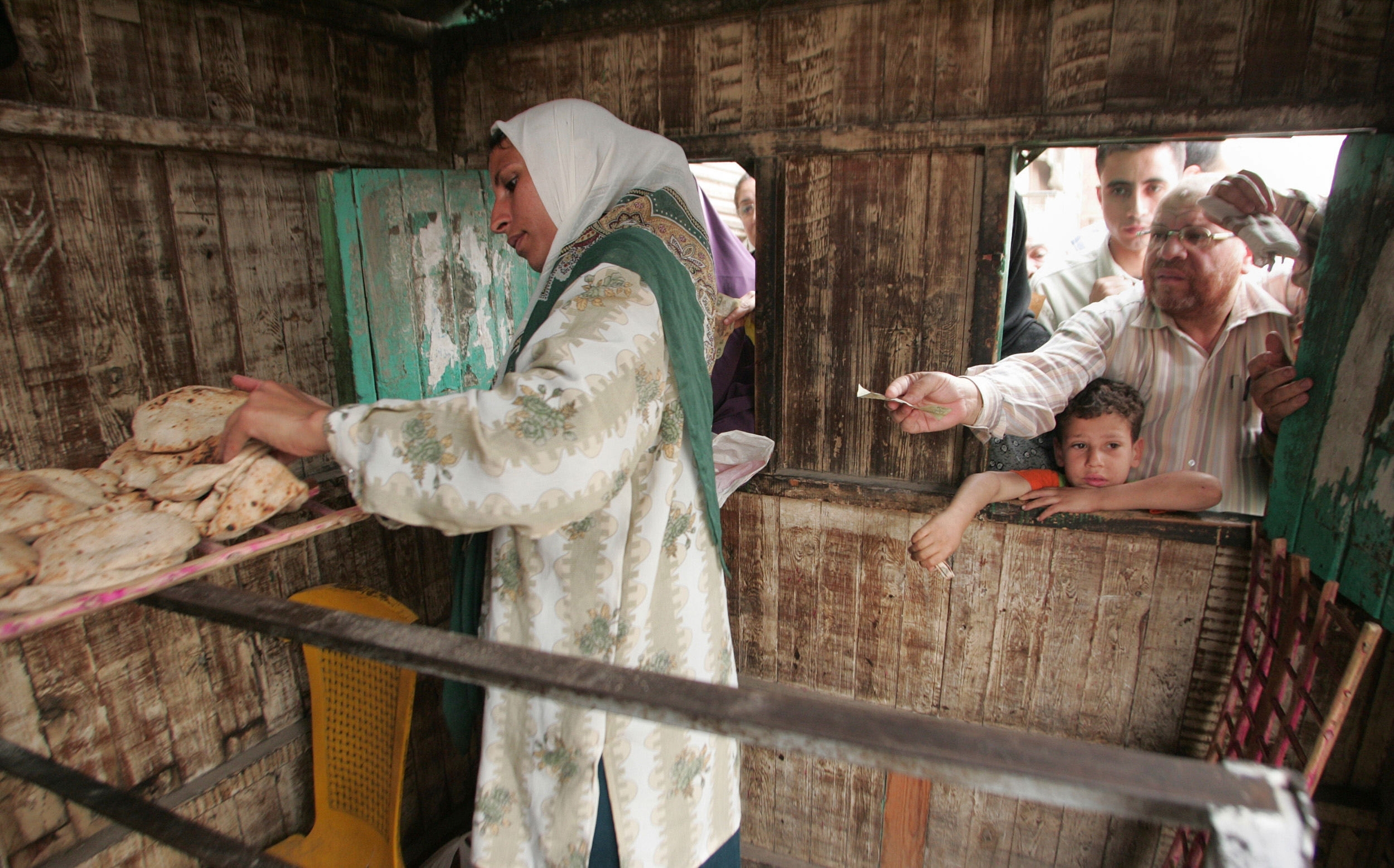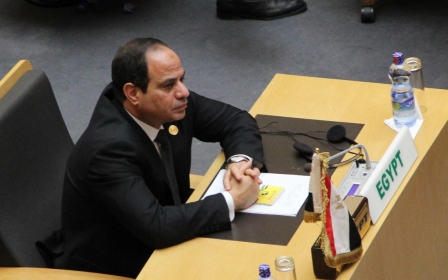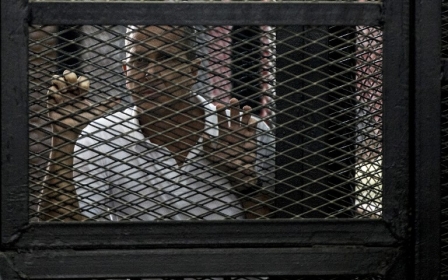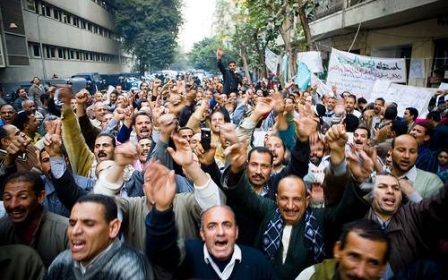Economic promise of 25 January remains elusive four years on

CAIRO - A couple of days before the 25 January anniversary, President Abdel Fattah al-Sisi was delivering a speech to the annual meeting of the World Economic Forum (WEF) in Davos, Switzerland.
After an enthusiastic introduction from the WEF’s founder and executive chairman, President Sisi said Egypt needed to “guarantee a decent life to the people of Egypt through private sector growth.”
“This means providing social justice, reducing red tape, creating equal opportunities for all investors, and ensuring sound fiscal and monetary policies,” he told the audience at Davos.
But back in Egypt, the economic assessments are less rosy. Aside from spiralling security threats from the Sinai Peninsula and home-grown bomb attacks that are almost a daily occurrence in Cairo these days, many observers suggest the economy is Sisi’s biggest challenge.
Without economic renewal, they say, Egypt could be on the brink of another uprising.
‘A better place’
Anhar is a mother of four from Giza. She has been an avowed supporter of Sisi since he ousted Mohamed Morsi as Egypt’s president, on the back of mass protests, in July 2013. While she accepts that things haven't yet really changed, she believes that Egyptians will soon watch their country “getting to a better place.”
“The economy for the moment suits the situation we’re living in,” she said. “When you look at all the political issues we’re facing, of course, this is how it’s supposed to be.”
“They [the government] are not magicians — they just need time. I think the best option is to leave [Sisi] for four years and, after that, we can try and change.” Apparently unaffected by subsidy cuts and electricity shortages, Anhar says life in the countryside has continued in the same way as ever — not easy, but not difficult either.
Mostafa, on the other hand, is a young middle-class engineer from Shebbin al-Kom in Sisi’s home governorate of Menufiya. Nowadays, he travels an hour each way between Shebbin and Cairo, from home to work and back again. He claims things are getting worse, not better.
‘How can a family live?’
“From a daily perspective, if I have to go from Shebbin to Cairo, I take a microbus and instead of four pounds (53 US cents), I now pay six or 10,” he explained. “As I heard my mother saying the other day — LE100 ($13) is not enough for vegetables and stuff for two or three days for the family. She needs another 100 to feed us. So what about a father who is earning only LE700 ($92) for a family to live off — how can that work?”
Central to Sisi’s project to revamp the economy is the Egypt Economic Development Conference (EEDC) — dubbed “Egypt The Future” — taking place in Sharm El-Sheikh between March 13-15. The aims of the conference include “present[ing] a clear and ambitious vision for a prosperous future Egypt and its people,” and “firmly position[ing] Egypt as an attractive destination on the global investment map.” An EEDC spokesman explained to Middle East Eye that the conference’s “reform program” aims to improve housing, infrastructure, as well as healthcare and education to “strengthen social inclusion.” It will also foster micro, small and medium enterprises within Egypt.
But events like the Sharm El-Sheikh conference, played out on newspaper front pages, and major infrastructure projects like the new Suez Canal, seemingly have little bearing on ordinary people’s lives.
“Economically, we haven’t improved at all,” Mostafa says acerbically. He wants to see more social spending and welfare policies to help Egyptians most in need, but he apparently has little faith in the system.
Saft al-Leban is a village on the outskirts of Giza, the western edge of Cairo. The village is a buzz of farmers on horse-drawn carts, lorries and tuk-tuks, where the smoke and dust of Cairene life meets mile-upon-mile of lush farmland.
Lack of opportunities
Mohamed lives in the village with his wife and little daughter. He venerated the revolution so much, he named his daughter after it — Tha’er (“revolutionary”). But nowadays, Mohamed is disillusioned, even if he believes the 2011 uprising briefly improved the lives of young Egyptians by rooting out the corruption and cronyism of Mubarak’s government.
“There were some changes after the revolution,” he admitted. “We used to have some more opportunities and many of the corrupt people were kicked out of the government. At least we felt we could affect change then. We could go to the government and report someone who was corrupt.”
“Now I’m back in the same kind of work. There’s a lack of opportunities,” Mohamed says.
At Davos, Sisi vowed to reduce unemployment to 10 percent by 2020. In a country where around half of the population is under 25, young frustrated men are often the ones looking for work.
“I’m struggling to find a job,” said Mohamed. In recent years he has worked in a restaurant, a private school, a mobile phone kiosk. He patches up his income by running a youth club in the village.
‘We haven’t seen any change’
The rest of the men in the family do the same. Mohamed’s father works for a government ministry and receives the national minimum wage ($158) given to most public sector workers. Still, he and his brother (Mohamed’s uncle) both work second jobs to tie the family over.
Mohamed is cautious in his criticism of the government, apparently driven by a stoical sense that this has been the same situation in the village since before 2011.
“There aren't a lot of opportunities for young people,” he said. “But it’s been like this, not only after the revolution — but before it as well.”
“[Sisi] hasn’t showed any sign that he wants to help the Egyptian people. And I’m not just talking about my neighbourhood — others, too. We haven’t seen any change.”
In Mahalla, a Nile Delta city that has long existed on the economic frontlines of Egyptian society, labour activist Kamal El-Fayoumi also says that little has improved for the city’s workers. Four years after the revolution, he still calls Egypt “one of the most mistreated countries in terms of workers’ rights.”
‘Mubarak’s men came back’
“So far, the change has been for the worst,” he said. “We went down on June 30 to try and fix the problems remaining after the revolution — but now it’s worse. Mubarak’s men came back.”
Mahalla has its own special place in the revolution’s history. A labour stronghold in northern Egypt, strikes outside the graffiti-clad wall of the Mahalla textiles company can have wide repercussions.
On 6 April, 2008 striking workers, activists and local residents came together to protest. Images of crowds stamping and burning posters of the then-president, Hosni Mubarak, were beamed around the country and galvanised the next three years of labour activism which were central to the 25 January revolution.
Early last year another strike, involving around 19,000 workers, spearheaded another wave of industrial unrest, which some observers claimed led to the mass resignation of Hazem El-Beblawy’s cabinet in February 2013.
But the most recent strike ended without a definite result, suggesting that “Mahalla’s labour movement seems stuck in a never-ending cycle of protests against government policies,” Mada Masr reported in mid-January.
With many of 25 January’s figureheads in prison, and security forces increasingly suppressing protests with violence, many agree that the economy is President Sisi’s biggest challenge — not the streets. Sisi has repeatedly told the population that if they desist with demonstrations, the “social justice” promised by the revolution will come.
Sisi’s balancing act
Sisi will have to play a balancing act, balancing between clamping down on protests while reforming enough to not give cause for protests; between a domestic population waiting for the economic prosperity they were promised, and an international community ready to invest big.
Labour activist Fayoumi says the president’s economic plans will not benefit Egyptians first.
“Foreign investments will come here and [the companies] will pay almost nothing for it, while making so much more as profit.”
Recent attempts at economic liberalisation have divided opinion about who benefits most. An amendment to Egypt’s investment law for example, passed in mid-2014, now means that third parties (lawyers, NGOs or citizens) can no longer lodge appeals against contracts between the state and international or national investors. This route had been used in the past to challenge corrupt deals, like the Madinaty case in 2006, but also high-profile privatisation of state-owned companies and assets.
The government meanwhile defended the move as a way of creating an amenable investment atmosphere for companies spooked by more than three years of unrest and uncertainty. Others, including the Egyptian Centre for Economic and Social Rights (ECESR), say it will open the door for corruption.
“It’s not us that’ll be getting the benefits [from more foreign investment],” Fayoumi argued. “It’s not for us — it’s for them.”
And yet he acknowledges that the population is tired and the government is unwilling to tolerate more protests. President Sisi has often argued that an Egypt without unrest will be a prosperous Egypt.
Many Egyptians are waiting to find out.
“Protesting has nothing to do with economics,” Mostafa argued. “I just want to see people earning more money, enough to actually support their daily life.”
Mohamed believes that if the president cannot deliver on his promises to the Egyptian people, unrest will follow.
“If people are affected economically, they will go down [to the streets],” he claimed. “What is going to affect the people most is the lack of needs. So if it’s going to be like under Morsi … it will force the people to go down.”
New MEE newsletter: Jerusalem Dispatch
Sign up to get the latest insights and analysis on Israel-Palestine, alongside Turkey Unpacked and other MEE newsletters
Middle East Eye delivers independent and unrivalled coverage and analysis of the Middle East, North Africa and beyond. To learn more about republishing this content and the associated fees, please fill out this form. More about MEE can be found here.




